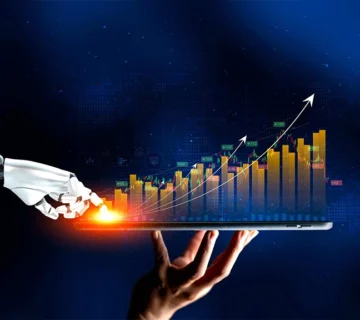The Unstoppable Rise of AI in Finance and Prop Trading
The rapid advancement of artificial intelligence (AI) is reshaping industries worldwide, and finance is no exception. From automated chatbots in customer service to complex algorithmic trading systems, AI is becoming deeply embedded across the financial sector.
Proprietary trading, or prop trading, a high-stakes field traditionally driven by sharp human analysis, is now seeing a growing reliance on AI. This naturally raises a key question: Will AI-powered systems eventually replace human traders in the world of prop trading?
In this article, we explore the expanding role of AI in prop trading, examining its capabilities, limitations, and the possible future of trading. Does the rise of intelligent machines mean human traders are becoming obsolete, or is a collaborative future more likely?
The Rise of AI in Prop Trading and Finance
The appeal of AI in prop trading is clear. Financial markets generate massive volumes of data, move at lightning speed, and require constant monitoring — conditions perfectly aligned with AI’s strengths. Machine learning models can process and interpret vast datasets far beyond human capacity, uncovering patterns and signals invisible to traders.
AI-powered systems can also execute trades in milliseconds, seizing opportunities from short-lived market inefficiencies. Unlike humans, AI operates without emotions such as fear or greed — factors that often distort decision-making — making it more consistent and disciplined.
Beyond prop trading, AI is already transforming the broader financial industry:
Algorithmic Trading: AI-driven algorithms underpin modern algorithmic trading. They range from simple rule-based models to advanced machine learning systems that adapt and optimize strategies in real time.
Risk Management: AI strengthens risk management by assessing portfolio risk, detecting fraud, and forecasting volatility. Machine learning tools can spot subtle risk signals that humans may overlook, enabling faster, proactive responses.
Portfolio Management: From robo-advisors serving retail investors to advanced tools used by institutions, AI helps optimize portfolio allocations, forecast performance, and automate rebalancing.
Customer Service: AI-powered chatbots provide 24/7 support, handling inquiries, offering account updates, and in some cases, delivering personalized financial guidance.





No comment